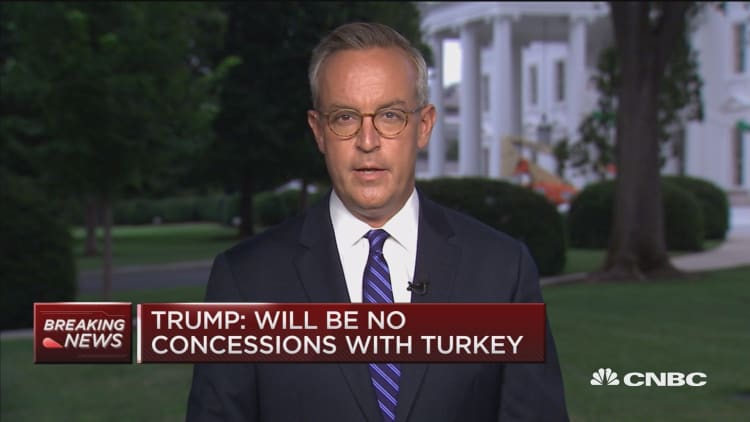Despite the growing tensions between the White House and Turkey, the Pentagon said Monday that the relationship between Washington and Ankara's military has not deteriorated.
"No there has been no interruption in our relationship with Turkey at all," U.S. Army Col Rob Manning told reporters Monday when asked if the tit-for-tat tariffs were impacting ties with the NATO ally.
Much of the recent tension has centered around an American pastor, Andrew Brunson, who was detained in Turkey n October 2016. Turkey accused the North Carolina native of spying and attempting to overthrow the government. Brunson has denied all charges.
Relations between the U.S. and Turkey have intensified over Brunson's trial and his continued detainment. The White House reportedly turned down an offer Monday from Ankara to drop an investigation into one of its largest state-owned banks in exchange for Brunson's release.
Earlier this month, the White House announced sanctions on Turkey's ministers of Justice and Interior for the arrest and detention of Brunson.
"We've seen no evidence that pastor Brunson has done anything wrong and we believe he is a victim of unfair and unjust attention by the government of Turkey," White House press secretary Sarah Huckabee Sanders said Aug. 1.
"As a result, any property or interest in property of both ministers within U.S. jurisdiction is blocked and U.S. persons are generally prohibited from engaging in transactions with them," Sanders added, referring further questions to the Treasury Department.
Read more: Turkey slaps tariffs on American booze, cars as business groups urge diplomacy
In response, Ankara announced tariffs on American cars, alcohol and cigarettes last week.
The measures come amid Turkey's currency crisis, which has seen the Turkish lira tumble more than 40 percent against the dollar since the start of this year. The government has called it a result of "economic warfare" on the part of the U.S., while economists point to Turkey's flawed monetary policy, widening current account deficit and high foreign-denominated debt as the primary cause of its economic woes.
Meanwhile, Congress is inching closer to blocking the transfer of two F-35 jets to Turkey.
The stealth fighter jets that hang in the balance
Turkey, an F-35 program partner, is currently slated to receive two of the jets. Lockheed Martin's fifth-generation jets are the first of what Ankara hopes will be the start of a 100-strong fleet.
In June, the U.S. defense giant held a formal hand-off ceremony at its F-35 facility in Fort Worth, Texas. After the ceremony, Lockheed ferried the aircraft to Luke Air Force Base in Arizona where Turkish pilots began training alongside U.S. airmen.
Meanwhile, Turkey is also trying to buy Russia's S-400 missile defense system, a move that has spooked U.S. lawmakers and defense officials.
"There is a general concern across the NATO alliance, and certainly within the Department of Defense and now in Congress, that the Turkish purchase of an S-400 would allow the Russians to have a backdoor into very hyperactive radar readings of the alliance's front-line jet for decades," Aaron Stein, a senior fellow at the Atlantic Council, explained to CNBC in a previous interview.
"If you kick Turkey out of the F-35 program, you're basically saying that they can't be trusted with this fighter jet and that calls into question the NATO alliance," he said.
Todd Harrison, senior fellow and director of defense budget analysis at the Center for Strategic and International Studies, noted that it would likely take months before the Senate's measure became law.
"So in the meantime, the administration can move ahead with the sale because it is not yet prohibited in law," Harrison said.
CNBC's Natasha Turak in London contributed to this report.
WATCH: Trump says no concessions to Turkey over American pastor



